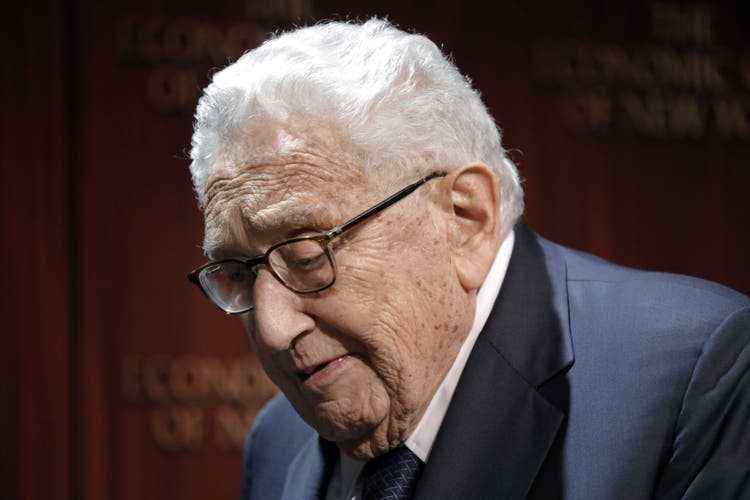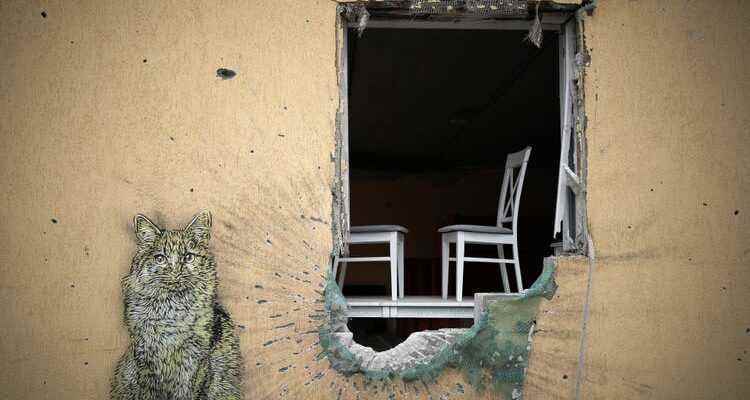We defend our freedom in Ukraine. This is not an idealistic-moralistic appeal, but rather an expression of a responsible and ethical perception of one’s own interests. It has drastic consequences.
The war in Ukraine requires the West to be clear about its own affairs. (Mural next to bullet hole in Irpin, photographed 30 May 2022.)
There is no doubt: the cost of military aid to Ukraine and economic bottlenecks resulting from sanctions against Russia will cost us dearly. And they will reduce our prosperity. Whether such sacrifices are appropriate depends on the answer to a single question: is Russia’s war of annexation against Ukraine merely a regional conflict in which we support those attacked out of sympathy and solidarity, or is it an aggression that seriously threatens the West, especially Europe, i.e. ourselves, our free self-image, our democratic political culture and, in the long term, also our prosperity?
To put it another way: is the Russian aggression against Ukraine also one against Europe or the West as a whole? As is well known, Russia is waging this war in a hybrid manner. And this war has long since begun. Just because the West, i.e. NATO, is not also fighting back militarily in Ukraine does not mean that we are not at war with Russia.
This is not a call to blur the lines between the use of military force and non-military means. Even less is the case for a direct intervention by NATO in the course of the war – on the contrary. Rather, it is about – to modify a well-known word – the realization: “If you want peace, then recognize that you are already at war.” That means: First, recognize how the enemy is waging his war against you – not with cannons and machine guns, but with propaganda, disinformation, influence and sabotage in cyberspace, by dividing public opinion and sowing mistrust and stirring up hatred.
The Russian strategy
Russia is attempting massive interventions to destabilize our democracies by influencing election campaigns and supporting extreme positions, both left and right, that encourage polarization and disenchantment with democracy. Evidence is accumulating that massive Russian funds are flowing into this. All of this is extremely dangerous.
In addition, Russia has managed to make Europe dependent on its raw materials. Now it is poised to take over Ukraine’s granary and thereby gain control of world food security. The recent Russian offer to unblock grain shipments from Ukraine in exchange for lifting sanctions is an easily understood trap. Putin’s Russia – whether it’s just his, remains to be seen – wants to achieve geopolitical hegemony in Europe with Ukraine and, with its access to Europe’s breadbasket, also that of Africa and elsewhere.

In the Ukraine, fields lie fallow. Image from Novopokrovka, a village southwest of Dnipro, May 20, 2022.
propaganda and disinformation
The enemy is the supposedly “decadent” USA: an image that creates anti-Americanism, which, as the fruit of years of Russian propaganda and disinformation, now reigns not only in left-wing minds but is also being propagated from the right. It is well known that the USA established a kind of hegemony itself in the wake of the Second World War and did not always behave as innocent angels. But the hegemony of the dollar and American military superiority is one under whose protection liberty and prosperity can flourish.
Of course, Russian disinformation also fuels Western doubts about the worth of the sacrifices made to prevent a Russian victory over Ukraine – a victory, one has to be aware, that avowedly ended Ukraine as sovereign state and a cultural nation oriented towards the West since the Middle Ages; as well as to the elimination of the Ukrainian political and cultural elite, to mass deportations, which have already begun in the conquered territories, and to the re-education of the “residual people” with the violence of systematic censorship and authoritarian rule – just look at today’s Russia.
Putin’s imperial dream
A Ukraine ruled by Russia in this way would bring a significant step closer to realizing Putin’s imperial dream. The Baltic States, with their large Russian population, and Moldova would find it difficult to escape Russia’s influence. The pressure on Poland would increase, especially since there is now an enormously large proportion of Ukrainians in the population. The social tensions that are likely to arise from this and will certainly be encouraged by Russia will then be used by Putin as a pretext for interference and pressure attempts. And that would only be the beginning.
In any case, Russia’s geopolitical strength, enhanced by a Russified Ukraine and strategically rounded off by satellite Belarus, will make itself felt in Europe in an uncomfortable way. Especially since then, in a world that has made peace with an imperial Russia, there would be no reason to continue resisting dependence on its oil and gas reserves. Otherwise, Russia could get its foreign exchange from China and India and, together with these heavyweight geopolitical actors – if only because of their sheer number of people – increase the pressure on Europe.
Kissinger’s intervention in Davos
A sober assessment shows that it is in the very own interests of the West and Europe in particular that Russia does not win this war and that space is created for a peace agreement on the basis of which Ukraine can continue to exist as a sovereign and democratic state. The aged Henry Kissinger said last May 23 at the WEF in Davos via video connection in a speech that was sometimes difficult to understand: Ideally, one should return to the “status quo ante”. And then leave Russia alone, because anything else would no longer be a war to liberate Ukraine, but a war against Russia.
Agreed! But what did Kissinger mean by “status quo ante” – what does the “ante” refer to here, the word “before”? In early March 2014, in a much-cited article in the Washington Post, Kissinger demanded, among other things, that Crimea be returned to Ukraine. The Donbass was not yet an issue at that time. Ukrainian President Zelensky is now calling for the Russian army to withdraw behind the lines before February 24, 2022 as a prerequisite for negotiations. That sounds reasonable too. Crimea and Donbass would then be the subject of negotiations.

Henry Kissinger in New York in December 2017.
The interests of Europe
But Kissinger’s proposal was unanimously communicated in a completely different way in the international press: It was widely read that he demanded that Ukraine cede territories, namely Donbass and Crimea, if not more. However, the words “territories”, “Donbass” and “Crimea” do not appear in Kissinger’s statements at all! So who manipulated Kissinger’s message and fed the leading media with the falsification of the statements of the 99-year-old old man, from which everyone else then copied? In any case, the result was an angry reaction from the Ukrainian President to Kissinger’s alleged demands, as well as howls of triumph from the Western pro-Russian media.
So anyone who raises the question of costs in terms of sanctions and arms supplies should first ask themselves whether they understand that we are already at war with Russia, or whether they prefer to turn a blind eye to reality. It is in the interest of Europe, of the West as a whole, to stop Putin. And for the time being, the only way to stop it is in Ukraine, by ensuring that it wins the war enough to force Russia to enter into negotiations on terms that are acceptable to Ukraine.
The fact that we are defending our freedom in the Ukraine is not an idealistic, moralistic, purely ethical appeal, but an expression of the responsible, ethical perception of our own interests. But those at war must also be willing to bear the associated costs, make the necessary sacrifices and accept the consequent limitations. This in turn could also have a healing effect in view of our spoiled feel-good and demanding society.
Martin Rhonheimer taught ethics and political philosophy at the Pontifical University of Santa Croce in Rome from 1990 to 2020. He is the founding president of the Austrian Institute of Economics and Social Philosophy in Vienna, where he currently resides.
